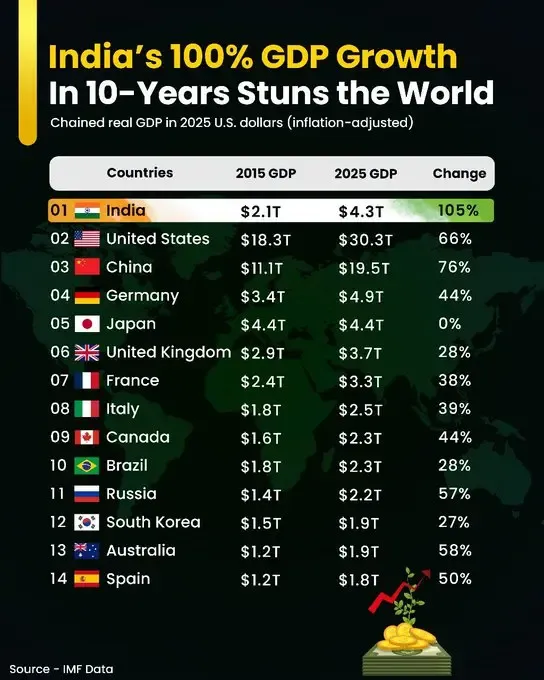India's GDP Set to Double in a Decade, Surpassing Japan and Germany by 2027

Synopsis
Key Takeaways
- India's GDP grew from $2.1 trillion to $4.3 trillion.
- Projected to surpass Japan in 2025 and Germany by 2027.
- Fastest GDP growth rate among major economies.
- Significant reforms under PM Narendra Modi's leadership.
- IMF highlights potential for advanced economy status by 2047.
New Delhi, March 22 (NationPress) India’s GDP has skyrocketed from $2.1 trillion in 2015 to an anticipated $4.3 trillion in 2025, demonstrating an impressive 105 percent growth, as per inflation-adjusted data from the International Monetary Fund (IMF).
This remarkable growth trajectory positions India as a global economic titan, expected to overtake Japan in 2025 and Germany by 2027, according to findings shared by BJP leader Amit Malviya on his X social media account on Saturday.
The GDP growth rate is the fastest among major economies, significantly eclipsing that of advanced nations. The IMF data underscores India’s rapid economic rise, driven by robust policy reforms and a vigorous growth momentum.
“This extraordinary achievement is a testament to the decisive leadership of Prime Minister Narendra Modi and the relentless efforts of his government,” Malviya stated.
Through proactive economic policies, bold structural reforms, and a continual focus on the ease of doing business, the PM Modi administration has positioned India as the world’s fastest-growing major economy—a title no previous government has attained since independence, he noted.
These transformative initiatives are not only fueling India’s economic growth but also placing it ahead of traditional global leaders, indicating a major shift in the global economic landscape.
Earlier this month, praising India’s “prudent” policies, the IMF Executive Board remarked that the country's robust economic performance could facilitate critical reforms to achieve advanced economy status by 2047.
India’s “strong economic performance presents a chance to advance essential and challenging structural reforms to fulfill its ambition of becoming an advanced economy by 2047,” noted the IMF report.
To foster accelerated growth, the IMF Executive Board emphasized that comprehensive structural reforms are necessary, as they are vital for generating high-quality jobs and invigorating investment.
High-frequency indicators suggest a sequential increase in the momentum of India's economic activity during the second half of 2024-25, likely to persist moving forward, according to the latest RBI monthly bulletin.
In a challenging and increasingly uncertain global environment, the Indian economy is set to maintain its status as the fastest-growing major economy during 2025-26, based on IMF and World Bank projections of GDP growth at 6.5 percent and 6.7 percent, respectively, the report highlighted.





